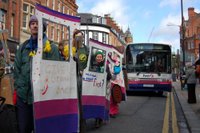Well, the BBC calls it deregulation, the rest of the population calls it privatisation. MPs have reported something that most bus users knew already that the privatised bus services are rubbish.  Passenger numbers are rising in London (by 32% in five years) which is heavily regulated (where there has been an emphasis on the revolutionary policy of having a frequent, reliable service that you can afford to take) but falling in the rest of the country (by 7% in five years) where routes often depend on how much money the companies can make out of them and reliability is sacrificed for minimising costs. In fact, profits outside of London are twice that of those inside - in directly inverse proportion to the level of service provided.
Passenger numbers are rising in London (by 32% in five years) which is heavily regulated (where there has been an emphasis on the revolutionary policy of having a frequent, reliable service that you can afford to take) but falling in the rest of the country (by 7% in five years) where routes often depend on how much money the companies can make out of them and reliability is sacrificed for minimising costs. In fact, profits outside of London are twice that of those inside - in directly inverse proportion to the level of service provided.
Even when the local council subsidise routes (as they do for the rural services here) we still end up with a slipshod, shonky bus service and drivers have seen an erosion of their wages and conditions, working long hours in hard traffic, often on split shifts. It's no wonder that workforce turnover and sickness is high and therefore morale and, not to put too fine a point on it, driving ability are falling.
I'm on the exciting and powerful body of the Cambridge Bus Users' Forum - I know what your thinking - why isn't Jim constantly bragging about this prestigious role? Well, modesty, of course. Anyway, it's not all glamour and links with organised crime, it's mainly about being told by the council not to be too militant and being ignored by the bus companies who, unfortunately are the ones who count.
It isn't just that the number three (or to give it's proper the "Bloody Number Three") can be little more than an illusion told to small children to give the impression that there once was a public transport system in this city (which might be a slight exaggeration, but only just) but some areas don't even pretend to have a proper service. Trumpington's Number 7 doesn't run on Sunday, which is just mad, and rural fares have changed making many pensioners far worse off.
I don't want to get all ideological or anything but a public transport system should be run for public need not private profit. The implications of allowing a highly subsidised private sector to run down the network not only has social implications for the poorest people in society, it also has a direct environmental impact making it near impossible to encourage some of the alternatives to car use.
I do have a solution, one I share with Linda Riordan MP, and Paul Truswell MP. Yes, you guessed right, it's renationalise the lot.
Thursday, October 26, 2006
Irregular service
Labels: Cambridge
Subscribe to:
Post Comments (Atom)

1 comment:
If some had their way, even the postal system would be private.
Canada has a private postal system. Mail sent out the same day, come faster to the US from Japan, than Canada.
Post a Comment